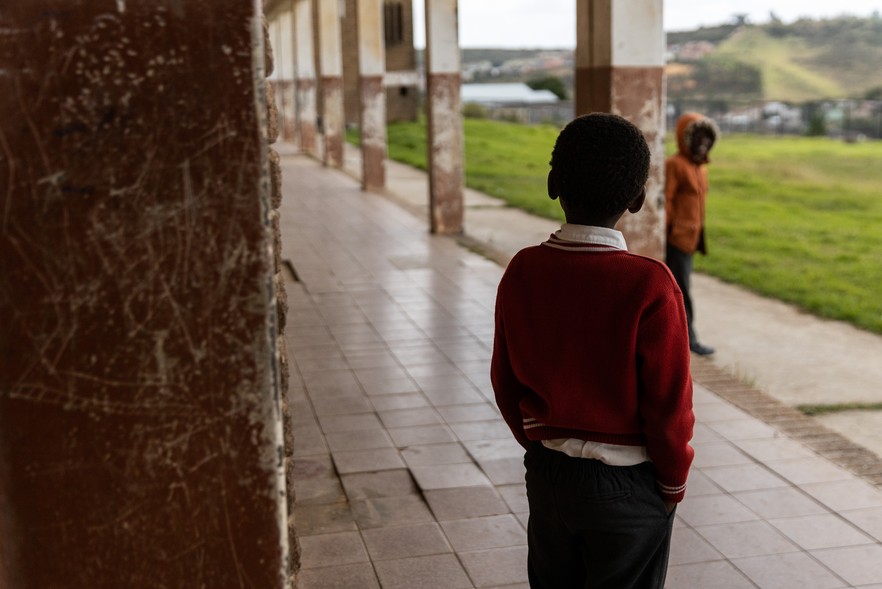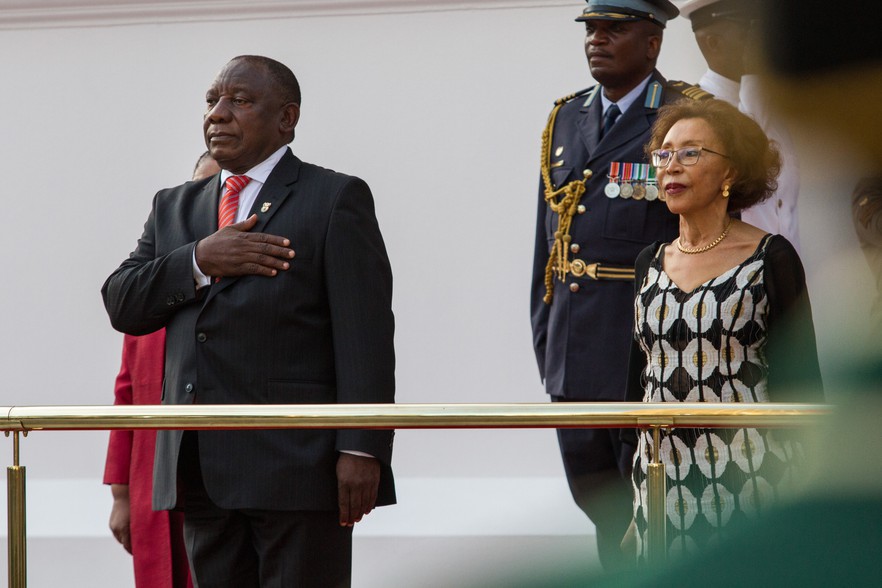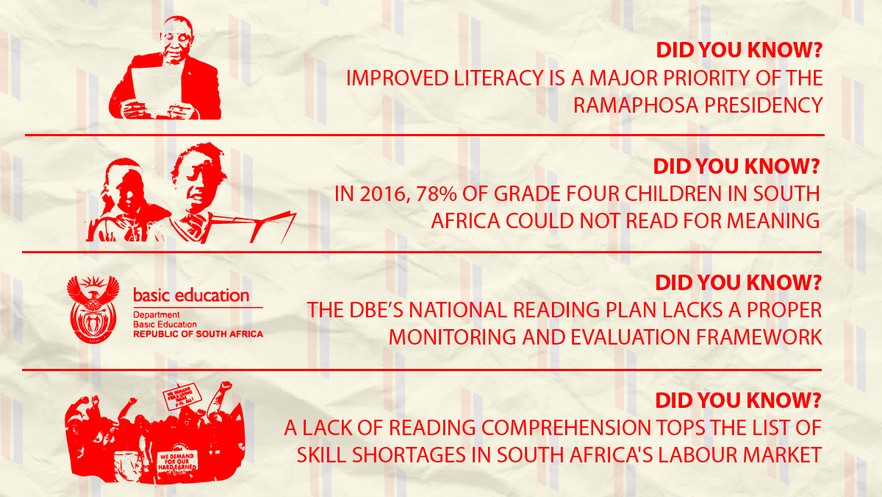Revealed: how Angie Motshekga’s reading plan failed SA’s children
President Ramaphosa announced a “massive reading campaign” in 2019. It never got off the ground.
The vast majority of ten-year-old children in South Africa cannot read for meaning. Photo: Ashraf Hendricks
- The National Reading Plan was supposed to help provincial education departments improve literacy between 2019/20 and 2023/24.
- In 2022 the education department’s Director General triumphantly told Parliament that the plan had been implemented by all nine provinces.
- But we have obtained documents that show that, except for the Western Cape, there has been no proper provincial planning or monitoring and evaluation.
- Education experts expect an upcoming assessment of South African literacy to show that the situation is worsening.
A “massive reading campaign” for South African schools announced by President Cyril Ramaphosa in 2019 has never got off the ground, despite triumphant claims in Parliament by the Department of Basic Education (DBE). Viewfinder and GroundUp can reveal that the Department’s National Reading Plan - which it had not made publicly available - is a seriously deficient document. Far from being a success, its supposed implementation is a collection of random, uncoordinated activities by provincial education departments with no proper monitoring.
In his 2019 Medium Term Strategic Framework, Ramaphosa announced “five fundamental goals” for the government over the next ten years. Ensuring that “every ten-year-old will be able to read for meaning” was one.
“This is essential in equipping children to succeed in education, in work and in life – and it is possibly the single most important factor in overcoming poverty, unemployment and inequality,” Ramaphosa said in his State of the Nation Address (SONA) in February 2019.
“If we are to ensure that within the next decade, every ten-year-old will be able to read for meaning, we will need to mobilise the entire nation behind a massive reading campaign,” Ramaphosa added upon his re-election later that year.
President Cyril Ramaphosa ahead of delivering the State of the Nation Address in February 2019. Archive photo: Ashraf Hendricks
In South Africa, 78% of the country’s ten-year-olds could not read for meaning in 2016. Though literacy had been slowly improving since 2006, experts expect a significant drop in the number of children who can read to be confirmed by results from the Progress on International Reading Literacy Study (PIRLS), to be published on 16 May.
The implications of this are alarming, not only for the learners but for the country as a whole. Last year, against a backdrop of spiralling youth unemployment, the Department of Higher Education and Training identified a lack of “reading comprehension” as the number one skill deficit in the country’s labour market.
So what went wrong?
Basic Education Minister Angie Motshekga last year attributed the decline in reading outcomes to the Covid pandemic, saying that learning losses had been experienced the world over. But Viewfinder and GroundUp’s exclusive access to the department’s National Reading Plan and its implementation reports show that the crisis is also the result of serious failures within Motshekga’s department.
Early in 2020 the DBE incorporated the President’s goal into its Strategic Plan. The department announced a newly developed “sector reading plan”, which it said would include the rollout of improved reading materials in African languages and better teacher training, based on findings from its long-running Early Grade Reading Study.
Last year, echoing the president’s ambition of a coordinated, nationwide programme to tackle illiteracy, the department’s Director General Hubert Mweli reported to Parliament that this National Reading Plan had been implemented by all nine provinces.
“All provinces have implemented the reading plan,” he said. “How do I know this? I know this because I chair meetings every year where they present reports on the implementation of their reading programmes. And for the past five to six years, provinces have been presenting reports based on this reading plan.”
“So every province has got a reading plan. [To] that I can put my head on the block,” Mweli went on.
But experts from the Reading Panel 2030 – a civil society organisation set up to monitor the government’s progress towards Ramaphosa’s goal – pointed out that this national reading plan had never been made public. Also, there is scant evidence in the department’s annual report, for the year Mweli was referring to, to substantiate his claim of universal implementation.
The plan and the provincial education departments’ progress reports for 2022/23, obtained through a public records request by Viewfinder and GroundUp, confirm that no “massive reading campaign” is underway in South Africa.
These records show that poor planning from the national department; random, uncoordinated reading interventions by most of the provincial education departments; and disorganised monitoring and evaluation of these interventions are all drivers of the country’s reading crisis.
What is the National Reading Plan?
The National Reading Plan, made public here for the first time, is a document that consists of a front page and a table listing 47 activities under ten thematic areas. Each “activity” has annual targets for every one of the plan’s five years: 2019/20 to 2023/24.
The plan contains a wide range of proposed activities: from rolling out classroom libraries and improved teacher training, to encouraging food companies to follow the Chappies bubblegum example of incorporating reading materials into their packaging. There is no information about how these interventions are to be implemented, who would be accountable, and how these are to be funded.
Design: Nathi Ngubane
An interview with the department’s head of research monitoring and evaluation, Stephen Taylor, revealed that the plan, never intended for public release, was developed to “guide” provincial education departments on activities they should pursue to improve reading outcomes. Taylor was speaking with current affairs television program Carte Blanche in a Viewfinder produced insert on the National Reading Plan.
On request, Taylor shared the provincial departments’ most recent progress reports on the plan’s implementation for the 2022/23 year. These reports, published here for the first time, show a disparity and a lack of coordination between the efforts of the nine provincial departments. For instance, whereas the Western Cape department’s report is detailed and extensively referenced, the Limpopo department’s report contains fewer than 200 words. The Reading Panel 2030 had previously pointed out that the Western Cape was the only province that had budgeted for and implemented a province-wide reading programme.
“Chaotic” reports
Professor Sarah Chapman, from the University of Cape Town’s Commerce Faculty, is an expert in monitoring and evaluation. She said the Reading Plan lacked a proper monitoring and evaluation framework, which would have included an implementation plan and an impact theory. A proper implementation plan, Chapman said, would have provided the provincial departments with a model on who exactly was supposed to do what, and how these activities were to be rolled out. An impact theory would have provided provinces with a rationale for why these activities would bring about the outcomes that the plan sought to achieve: improved reading outcomes for children.
The overall result of these shortcomings in the plan, she said, was that the provinces’ reports were “chaotic”.
“My impression is [that the provinces] were just including anything that they have done – teacher training, press releases, attendance registers, any partnership with an NGO. There’s no theory around how this fits together and why specific activities are important and why they would lead to any intended outcomes,” she said.
Documentation included by the provinces as supposed evidence for their activities had not been collated into a monitoring and evaluation framework.
“A monitoring framework would have tracked the logic of the programme. I’m not seeing that,” Chapman said.
The provinces’ reports rarely included measurements of progress towards the annual targets laid out in the plan.
“If they had that data, then they would have reported against the [plan’s] targets. They would have said we’ve moved towards the target by so much. But, these reports definitely weren’t doing that. From a monitoring and evaluation perspective, one cannot say that the strategy was implemented successfully. There’s no evidence for that,” she concluded.
The department’s response
The department’s spokesperson Elijah Mhlanga did not respond to a request for comment on these criticisms of the plan.
In response to a records request, the department provided a writeup of what it considered some achievements towards the plan’s implementation. This response, which did not refer directly to the 47 activities listed in the plan, included metrics on teacher training and delivery of materials to schools, but the numbers involved were very small.
Asked to respond to the suggestion that the plan and its implementation were “an abject failure”, the DBE’s Taylor said: “Well, I think it would be very unfair to call the existing plan and the weaknesses and the implementation against the existing plan an abject failure because of the timing of this plan. As I’ve said, this plan was something that was approved just before the pandemic set in, and we had to respond to the priorities caused by the pandemic.”
He added: “We really do agree that this is a priority. And that’s why we are working on a new revised version of the reading plan, which we hope to make a public document. It needs to succeed in bringing better coordination to the sector. Because in the last four years, a lot has happened. Lots of activities have happened, but they’ve often been rather uncoordinated.”
GroundUp asked for comment from Mweli, his personal assistant and the department’s spokesperson, Elijah Mhlanga. This provided Mweli with an opportunity to respond to the conclusion that his claim in Parliament – that the reading plan was implemented by all nine provinces – was false. He did not respond.
© 2023 GroundUp. This article is licensed under a Creative Commons Attribution-NoDerivatives 4.0 International License.
You may republish this article, so long as you credit the authors and GroundUp, and do not change the text. Please include a link back to the original article.
We put an invisible pixel in the article so that we can count traffic to republishers. All analytics tools are solely on our servers. We do not give our logs to any third party. Logs are deleted after two weeks. We do not use any IP address identifying information except to count regional traffic. We are solely interested in counting hits, not tracking users. If you republish, please do not delete the invisible pixel.





